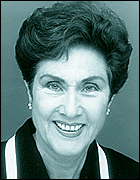

![]()
Gathering Places


![]()
Gathering Places
Remembering Vietnam may be an apt parallel for citizens and policymakers to ponder as they sort out what is in store for the nation after the shock, horror and humiliation of the air raids by four hijacked commercial airliners on Sept. 11. In this new war,
we must learn from
Vietnam errorsRemembering 'Nam is a closer comparison than is Pearl Harbor for what may lie ahead. Rather than a clearly identifiable, uniformed enemy employing conventional military equipment and formations against military targets, the United States faces an adversary more like the one that flourished in the early stages of the Vietnam conflict. Then terrorists wearing peasant's black pajamas and preaching Communist-based dreams for the future were here today and gone tomorrow.
As a journalist who covered the Vietnam War for seven years, I see historical evidence that the Sept. 11 hijacked airliner attacks signal the makings of a Vietnam-like guerrilla struggle against the globalized, computerized information age. Beneath the U.S.-labeled threats of Muslim extremists lie root causes of terrorism and anti-Americanism that need analyzing and addressing.
Remembering Vietnam calls forth the painful lesson that each escalation of U.S. involvement was followed by more numerous and more determined hit-and-run guerrillas, who in turn escalated their own forces. After a buildup to 543,000 U.S. combat troops and a U.S. killed-in-action total of 58,191 -- plus thousands of civilian, allied and enemy casualties -- the end came in 1975 with the humiliating defeat of the U.S. war machine in a small country half a world away from its homeland.
Today's terrorists have escalated from car-bombings in and after 1993 to the Sept. 11 hijackings that convert commercial airliners into missiles. Their next escalation may be not in numbers or in geographic scope but in a new level of horror unleased by even more ghastly weapons on U.S. soil.
Besides remembering how Vietnam ended, one might also remember how the United States stumbled into it so badly. Mistakes made by U.S. decision-makers have been candidly cataloged by one of the most influential of the era, Robert S. McNamara, who served as Secretary of Defense from 1961 to 1968.
In his 1995 chilling confessional on the "tragedy and lessons of Vietnam," McNamara recalls one pivotal period in 1963. Then the U.S. administration government stumbled into aiding the overthrow of the South Vietnamese government that it had backed for years and later by introducing U.S. ground units. "In retrospect, we erred seriously in not even exploring" an option for South Vietnam's neutralization that had been proposed by French statesman Charles de Gaulle, McNamara recalls.
Two other mistakes cited by McNamara and worth remembering were the "profound ignorance of the history, culture and politics of the people in the area" and the failure to "recognize the limitations of modern, high-technology military equipment, forces and doctrine in confronting unconventional, highly motivated people's movements."
Remembering Vietnam now is painful, but may be worthwhile if mistakes made then are not forgotten and repeated.
Beverly Ann Deepe Keever teaches journalism
at the University of Hawaii in Manoa.